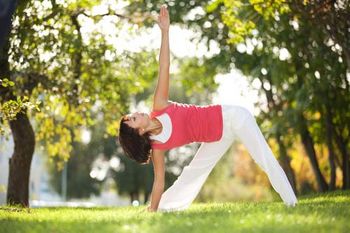Exercise as a miracle cure – What happens when you exercise (more)
Scientific support: Prof. Dr. Christine Joisten, Prof. Dr. Cora Weigert, Prof. Dr. Dominik Pesta
If exercise were a pill, you would be suspicious of all the claims it made on the package leaflet.
But because it affects the entire body and humans have always been designed for a life in motion, it really can have a wide range of health benefits.
Click here for various training plans to either start exercising or to bring a little variety into your existing training regimen. We hope you enjoy trying out different ideas!

The effects of exercise:
Exercise...
- reduces the likelihood of developing type 2 diabetes because it burns calories and improves the effect of insulin.
- has a positive effect on the liver, because it reduces elevated liver fat, which in turn reduces the risk of type 2 diabetes.
- lowers the risk of heart attack and stroke by boosting circulation throughout the body and training the heart and vessels.
- lowers the risk of cancer by activating certain immune cells responsible for body defense.
- Helps reduce stress, improves mood and prevents mental illness by triggering the release of endorphines (happy hormones) and breaking down the stress hormone cortisone.
- Strengthens the body’s defenses by activating the immune system.
- Supports brain function and keeps you mentally fit, because it boosts blood circulation and networking in the brain.
- Lengthens – statistically – the healthy lifespan by lowering a range of health risks and affecting cell aging.
- Is a sociable activity, especially if you are working out in a team or with friends or colleagues.
You do not need to be a marathon runner to feel the health benefits. A study in 2019 showed that leisure football increased physical fitness: Blood pressure, resting pulse and fat mass are all reduced and cholesterol values improved. Better physical fitness can protect from many diseases and an early death in the long-term.
How can I improve my own fitness?
You can improve your own fitness by incorporating exercise into your daily routine and with almost every type of sport, be it zumba, swimming, running or just going for a brisk walk. The main thing is that you exert yourself a little and stick to it. Of course, you should listen to your own body, not overdo it and slowly and gradually increase how often and how intensively you exercise.
Which argument most appeals to you? Find out exactly what can motivate you and get started – our training plans can help you.
Sources:
Colberg, S. R. et al.: Exercise and type 2 diabetes: the American College of Sports Medicine and the American Diabetes Association: joint position statement. In: Diabetes Care, 2010, 33: e147-e167
Duggal, N. A. et al.: Major features of immunesenescence, including reduced thymic output, are ameliorated by high levels of physical activity in adulthood. In: Aging Cell, 2018, 17: e12750
Fiuza-Luces, C. et al.: Exercise benefits in cardiovascular disease: beyond attenuation of traditional risk factors. In: Nat Rev Cardiol, 2018, 15: 731-743
Hollstein, T.: Sport als Prävention: Fakten und Zahlen für das individuelle Maß an Bewegung. In: Dtsch Arztebl, 2019, 116: 35-36
Milanović, Z. et al.: Broad-spectrum physical fitness benefits of recreational football: a systematic review and meta-analysis. In: Br J Sports Med, 2019, 53: 926-939
Moore, S. C. et al.: Association of Leisure-Time Physical Activity With Risk of 26 Types of Cancer in 1.44 Million Adults. In: JAMA Intern Med, 2016, 176: 816-825
Oja, P. et al.: Health benefits of different sport disciplines for adults: systematic review of observational and intervention studies with meta-analysis. In: Br J Sports Med, 2015, 49: 434-440
Wen, P. W. et al.: Minimum amount of physical activity for reduced mortality and extended life expectancy: a prospective cohort study. In: Lancet, 2011, 378: 1244-1253
Werner, C. M. et al.: Differential effects of endurance, interval, and resistance training on telomerase activity and telomere length in a randomized, controlled study. In: Eur Heart J, 2019, 40: 34-46
As of: 03.12.2019







